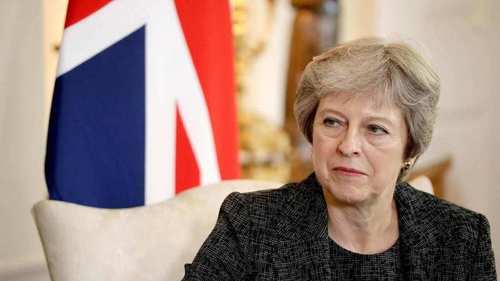LONDON: Britain’s Conservative government and the opposition Labour Party resumed Brexit talks on Tuesday to try to find a way to break the deadlock in parliament over the country’s departure from the European Union.
After Prime Minister Theresa May’s deal was rejected three times and she was forced to delay Brexit, the government has spent more than four weeks in talks with Labour — negotiations that have done little to soften positions in either party.
So far, there has been no agreement and few held out any hope of a breakthrough. The government on Tuesday also conceded Britain would take part in European elections this month, a poll which could deliver more bruising results to both major parties.
Almost three years since Britain voted to leave the EU, there is little clarity about how, when or even if Brexit will happen.
David Lidington, May’s de facto deputy, said despite taking part in the elections to the European Parliament on May 23, there was still time to avoid those elected taking their seats.
“Ideally we would like to be in a situation where those MEPs from the UK never actually take their seats in the European Parliament, certainly to get this done and dusted by the summer recess,” he said, referring to parliament’s summer break which usually begins in the second half of July.
May deeply regretted the move, her spokesman said, describing the prime minister as determined to find a way to get a deal to leave the EU over the line. The Labour talks are an attempt by May to find a new path to what she calls “a stable majority” for a deal.
Earlier, May told her cabinet last week’s local elections, when the Conservatives lost hundreds of council seats, underlined the need to get on with Brexit.
“The prime minister said that while an agreement with the opposition had not been reached, the public had sent a clear message in the local elections that they want both of the main parties to get on with delivering Brexit,” her spokesman said she told ministers.
However, many pro-EU lawmakers used the results of local elections to argue that the tide is turning against Brexit after the Liberal Democrats, who support opposed Brexit and want a second referendum, gained many council seats.
European elections
Taking part in the European elections is a further blow to May who, after securing a divorce deal with the EU in November, has been unable to implement the agreement and faces growing calls to bring forward her decision to stand down as prime minister.
She was to meet the chairman of the Conservative 1922 Committee, an influential party group which can make or break Conservative Party leaders, on Tuesday.
A spokesman described it as a regular meeting, though some newspapers reported that its chairman Graham Brady would demand a firm timetable for her departure.
May was not alone in wanting to avoid European elections. Like the Conservatives, the Labour Party fears voters will again punish them by voting for alternative parties which have a clearer stance on Brexit.
Conservative Brexit supporters might flock to the newly launched Brexit Party of former UKIP leader Nigel Farage, a staunch opponent of Britain’s EU membership. Pro-EU Labour voters could turn to Change UK, another new party, or support the Liberal Democrats.
But with both parties, like much of the country, deeply divided over Brexit, any breakthrough from Tuesday’s talks might be hard to come by.
Labour sources were dismissive of weekend reports the government would offer new concessions, including a temporary customs union with the EU until a national election due in June 2022, saying such a proposal would not go far enough.
That offer was quickly played down by Foreign Secretary Jeremy Hunt, who said he did not believe a post-Brexit customs union would offer a sustainable long-term solution.
“I want to look at whatever deal is come to between the parties and I know this is a crucial week,” he told BBC radio.
Published in Dawn, May 8th, 2019















































